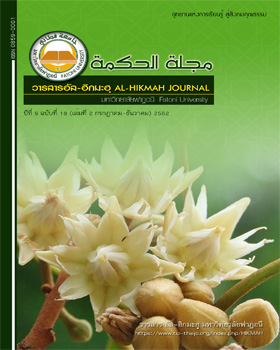Communication in Popularity Building of Political Local Leaders
Keywords:
Communication process, Communication strategy, Popularity building, Political localAbstract
This research to study the Communication in Popularity Building of Political Local Leaders 1) characteristics of the leader 2) Communication process 3) communication strategy 4) approach to development communication.
This is a mixed methods research first’s qualitative research based on 10 local leader who ‘s Chief Executive of the PAO, Mayor and Chief Executive of the SAO . The sample is selected through purposive sampling. Data is collected using an in-depth interview form and analyzed using descriptive analysis. Second’s surveying research; population of the research is 1,200 people living in local leader area. The tool of the research is questionnaire; and data statistical analysis by using computer program, and report in frequency and percentage.
The research found that communication to popularize local political leaders 1) The characteristics of leaders must have a history of continuous public assistance. Be realistic, realistic Have fun talking. Have a friendly, easy to understand short, say the truth, speak often emphasized. Work for the collective Listen to people's stories. 2) Communication process. Must be a good planner. There are several network conferences involved in the plan. (1) Reliable carrier planning. The content that meets the needs of the people in the area and uses the local language is short, easy to understand. Most labels are used. Focus on reaching the public as much as possible. Recipients are grouped by area. (2) Organization is complex. Distributed resource management for each area equally. Communication activities focus on public communication. Directing and coordinating via mobile phones. Monitored and controlled by local political leaders and networks in the area; (3) assessment of perceptions by observing behaviors and evaluations through networks after the public meeting area. 3) Communication strategy is to create a network with continuous network coverage. Creating relationships by emphasizing the same brotherhood. Creating activities focused on continuing activities in the area. Creating awareness 4) The development of communication for the popularization of local political leaders. (1) The characteristics of the leader. speak seriously (2) The communication process is planned to meet the needs of the people, using the media in continuous communication. Distributed control operations in all areas. (3) communication strategy. Build and expand network relationships through ongoing activities to generate awareness of local political leaders.
References
จรัส สุวรรณมาลา .(2550). วัฒนธรรมการเมืองท้องถิ่นในประเทศไทย . วารสารสถาบันพระปกเกล้า ปีที่ 5 ฉบับที่ 3 หน้า 83-106
จุมพล หนิมพานิช (2551) ผู้นำ อำนาจ และการเมืองในองค์การ. สำนักพิมพ์มหาวิทยาลัยสุโขทัยธรรมาธิราช.นนทบุรี
ชุตินันท์ แดงสกล (2556) ภาวะผู้นำการเปลี่ยนแปลงของผู้บริหารองค์การบริหารส่วนตำบล ในอำเภอพะโต๊ะ จังหวัดชุมพร. ปัญหาพิเศษ หลักสูตรรัฐประศาสนศาสตรมหาบัณฑิต สาขาวิชาการบริหารทั่วไป วิทยาลัยการบริหารรัฐกิจ มหาวิทยาลัยบูรพา.
นันทนา นันทวโรภาส (2554) ชนะเลือกตั้งด้วยพลังการตลาด. สำนักพิมพ์แมสมีเดีย.กรุงเทพฯ
พิชญ์ณิฐา พรรณศิลป์ , สัญญา เคณาภูมิ และเสาวลักษณ์ โกศลกิตติอัมพร (2558) บทบาทของผู้บริหารท้องถิ่นในศตวรรษที่ 21. วารสารสันติศึกษาปริทรรศน์ มจร. ปีที่ 3 ฉบับที่ 2 หน้า 146 - 160
รัชดา ธนูศิลป์ (2552) กลยุทธ์การสื่อสารเพื่อ ให้ได้รับการเลือกตั้งของนายกองค์การบริหารส่วนตำบลในจังหวัดสุรินทร์ .วิทยานิพนธ์หลักสูตรปริญญานิเทศศาสตร์มหาบัณฑิต. มหาวิทยาลัยสุโขทัย ธรรมาธิราช, นนทบุรี.
มนัสชนก สุรชัยกุลวัฒนา .(2557). รูปแบบการสื่อสารเพื่อการสร้างภาพลักษณ์ของผู้ นำท้องถิ่นในจังหวัดนครปฐม. วารสารอิเล็กทรอนิกส์การเรียนรู้ทางไกลเชิงนวัตกรรม
ลิขิต ธีรเวคิน (2550) วิวัตนาการเมืองการปก ครองไทย. สำนักพิมพ์มหาวิทยาลัย ธรรมศาสตร์. กรุงเทพฯ
สนธิ บุญยรัตกลิน .(2552). การศึกษาคุณลักษณะที่เหมาะสมของผู้นำทางการเมืองในสถานการณ์ปัจจุบัน ศึกษาเฉพาะกรณีความเห็นของชาวกรุงเทพมหานคร. รายงานวิชาการส่วนบุคคล. หลักสูตรการพัฒนาการเมืองและการเลือกตั้งระดับสูงรุ่นที่ 1
สมบัติ บุญเลี้ยง อารีย์ นัยพินิจ และธงพล พรหมสาขา ณ สกลนคร (2555) ลักษณะภาวะผู้นำที่ดีในการบริหารองค์กรปกครองส่วนท้องถิ่น. วารสารมนุษยศาสตร์สังคมศาสตร์ มหาวิทยาลัยขอนแก่น. ฉบับที่ 29 เล่มที่ 2 พฤษภาคม - สิงหาคม 2555
สมบัติ สินลือนาม (2555) คุณสมบัติที่พึงประสงค์ของผู้บริหารท้องถิ่นตามหลักทศพิศราชธรรมและหลักการบริหารยุคโลกาภิวัฒน์ในทัศนะของประชาชนผู้มีสิทธิเลือกตั้ง กรณีศึกษาเฉพาะในเขตเทศบาลตำบลศาลายา อำเภอพุทธมณฑล จังหวัดนครปฐม. วารสารวิทยบริการ. ปีที่ี 23 ฉบับที่ 1 มกราคม-เมษายน 2555
เสถียร เชยประทับ (2554). การสื่อสารและการตลาดการเมือง. กรุงเทพมหานคร : สำนักพิมพ์จุฬาลงกรณ์มหาวิทยาลัย.
อรอนงค์ สวัสดิ์บุรี .(2552). รูปแบบการสื่อสารของนักการเมืองท้องถิ่น. วารสาร วิชาการ มหาวิทยาลัยหอการค้าไทย
อรณิชชา ทศตา อนุชา พิมายนอก สุกัญญา ใจอดทน และจันทร์จิรา ใจอดทน (2558) การศึกษาความคาดหวังของประชาชนที่มีต่อภาวะผู้นำของผู้บริหารองค์กรปก ครองส่วนท้องถิ่น ในจังหวัดนครราช สีมา. เอกสารการประชุมวิชาการและเสนอผลงานวิจัยระดับชาติ “สร้างสรรค์และพัฒนา เพื่อก้าวหน้าสู่ประชาคมอาเซียน” ครั้งที่ 2 18-19 มิถุนายน 2558 ณ วิทยาลัยนครราชสีมา อําเภอเมือง จังหวัดนครราชสีมา หน้า 539 - 545
Deborah J. Barrett .(2014).Leadership communication. Singapore: McGraw-Hill Education.
Hugh Bochel and Catherine Bochel (2010) Local political leadership and the modernisation of local government, Local government studies journal, volume 36, pages 723-737
Ivan B. Dylko (2013) On the role of technology in political communication research. Journal of Javnost-the public volume 20, pages 55-70
Jack M. Mcleod, Dietram A. Scheufele and Patricia Moy (1999) Community, communication, and participation: The role of mass media and interpersonal discussion in local political participation. journal political communication. volume 16, pages 315-336
Michael Cuthill (2002) Exploratory research: citizen participation, local government and sustainable development in Australia. Business strategy and development journal, volume10 ,pages 79-89
Mike Goldsmith and Helge Larsen (2004) Local political leadership: Nordic style, International journal of urban and regional research, volume 28, pages 121-133
Newman I. Bruce. (1999). Hand Book of Political Marketing. California : Sage Publications Inc.
Purnendra Jain (2004) Local political leadership in Japan: A harbinger of systemic change in Japanese politics?, Policy and society journal, volume 23, pages 58-87
Steve Leach and David Wilson (2002) Rethinking local political leadership, Public administration journal, volume 80, pages 665-689
Scott W. Campbell and Nojin Kwak (2011) Political involvement in mobilized society : the interactive relationships among mobile communication, network characteristics, and political participation. journal of communication 61 2011,1005-1024
Vivien Lowndes and Steve Leach (2004) Understanding local political leadership: constitutions, contexts and capabilities, Local government studies journal, volume 30, pages 557-575
Yu Minggui,Hui Yafu and Pan Hongbo (2010) Political connections,rent seeking,and the fiscal subsidy efficiency of local governments. economic research journal. volu



